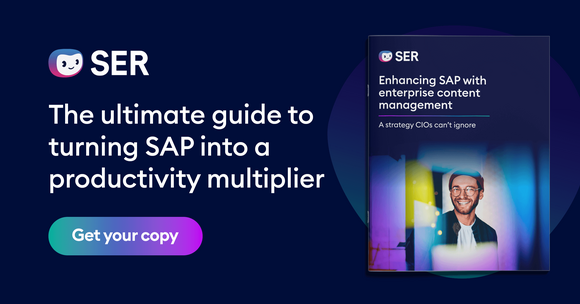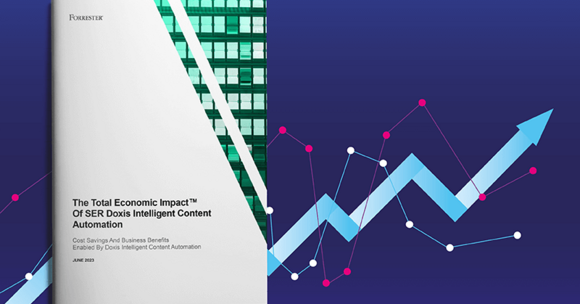SER Blog Customer Stories & Use Cases
7 key benefits of digital contract management
Marc Volquardsen
Regardless of size or sector, companies conclude a wide variety of contracts: from employment and real estate contracts to software licenses and master agreements with customers and suppliers. And that’s just the beginning! For legal purposes, all these different contracts have to be archived on a long-term basis, but they also need to be readily available to regularly find information, for example, about contract terms, contact persons or deadlines.

Globalization is also contributing to a rise in requirements: For contracts with international partners, companies must take into consideration various legal systems and political factors. Contracts in this context are often complex, multilingual and include addenda such as licensing agreements or certifications for local markets. These also have to be readily available. Furthermore, ever-changing market conditions require quick adaptability, also in terms of business relationships and their related contractual provisions.

Contract management done right
Is transparent, well-organized and secure company-wide contract management possible? It is! Check out our brochure about Doxis Contract Management to get all the details.
Read MoreHow digital contract management works
The International Association for Contract & Commercial Management estimates that, due to insufficient or a complete lack of contract management, companies lose on average around nine percent in revenue per year. Centralized, digital contract management can prevent such losses by storing contracts and all related documents in digital files and archives. These eFiles document the entire life cycle of a contract from preliminary negotiations to contract signing, from renegotiation to termination and digital archiving.
GEFA BANK has designed its entire contract process to be transparent so that all contract versions, contract-related documents and also all procedures are linked clearly. From contract numbers, customer names, etc., GEFA staff can quickly find all the information they need to provide customers with information and process contracts at any of its locations.
Even more complex are the challenges facing the international FEV Group, which works as a development service provider in the automotive industry. With five national companies, more than 40 locations on all continents and highly diversified, constantly changing requirements from customers, these activities can be handled better by implementing cross-departmental contract management. It makes all processes, along with all related documentation, available company-wide and empowers employees in all languages used in the group.
These two case studies clearly demonstrate that digital contract management adds significant benefits to a business by providing a 360-degree view of the entire life cycle of a contract. This results in significant efficiency gains in controlling.
The business benefits of digital contract management
Companies in all industries can benefit from the following advantages of digital contract management:
- Ability to provide information: When departments manage contracts separately and using their own systematic, this exacerbates centralized access and creates information silos. With company-wide, centralized archiving, digital contract management brings together all the contracts containing the relevant context information from different channels and systems. All the information is stored in one place and is no longer distributed to different systems. The employees in the company thus have a better basis of information and can access contracts across departments. It allows them to provide information on a faster and more informed basis, as well as enables them to make better decisions. Ultimately, this increases workflow speed, making companies more agile and flexible when responding to requirements and questions, e.g. from customers.
- Cost control: Many contracts, especially for software services, are automatically extended unless advance notice is provided. Digital contract management helps users to avoid such mistakes. Deadlines and contract terms are transparent at all times. Contract managers are automatically reminded to review, approve and terminate contracts. This avoids unwanted contract renewals and associated costs.
- Transparency: For contract processes, every step must be traceable. Changes and decisions must be documented and verifiable – even years later. Digital contract management archives the entire contract history, including correspondence and all memos in an audit-proof format. This provides greater legal security, as companies can demonstrate compliance with contracts, negotiations and decisions at any time.
- Fast adaptability: When the demand for products and services rises or decreases, the contractual conditions of business relationships with suppliers, partner, customers, etc. need to be adapted quickly. Digital contract management increases your ability to respond to changes: automated workflows enable your teams to quickly review, adjust and manage contracts. Business partners can be directly integrated into the process. For example, in a secure virtual room they can give their digital signature via integrated eSignature solutions such as DocuSign, Xitrust, FPSign or AdobeSign. This means that contract adjustments can be made rapidly to ensure business continuity.
- Better image: A typical authorization concept for the contract management application with multiple users prevents unmonitored and unauthorized access to contracts. As a result, companies are able not only to reduce the financial risks associated with data loss or attacks by cyber criminals. In the end, this also protects a company’s image, which would otherwise suffer from negative media reports.
- Process optimization: Digital contract management facilitates the preparation of reports for business analysis, which leads indirectly to cost benefits. The controlling department and CFO can get an overview at any time of all the currently valid contract terms and automatically retrieve the desired KPIs from the document collection. This enables better liquidity planning and helps to streamline process efficiency.
- Error minimization: An application for digital contract management can also be integrated with other systems such as SAP or Microsoft Office. This allows data to be worked on directly in a specialized application or in Microsoft Office, without users having to jump back and forth between the two applications. Another benefit is the ability to automatically update data in the respective applications. This ensures that erroneous information does not populate the other applications.
Tapping efficiency potential
Digital contract management is an important building block for end-to-end digitalization in companies and can help them leverage a high level of efficiency potential. This calls for cross-divisional digital processes that remove the data silos in companies. These processes in turn bring together information centrally from all departments to glean business insights and to make better business decisions.
Marc Volquardsen
I am a Product Manager [&] Solution Architect and have been with the SER Group since 2004. After 15 years as a Solution Consultant for Sales, in 2020 I switched to Product Management, where I design solutions for customers based on Doxis, SAP and Salesforce. Please feel free to contact me to talk about solutions for you!

The latest digitization trends, laws and guidelines, and helpful tips straight to your inbox: Subscribe to our newsletter.
How can we help you?
+49 (0) 30 498582-0Your message has reached us!
We appreciate your interest and will get back to you shortly.




